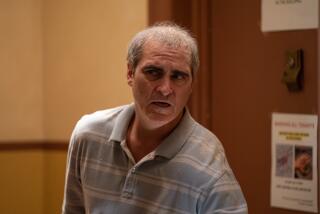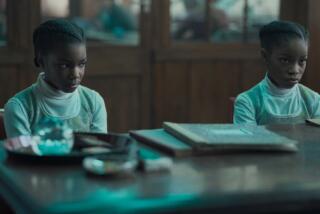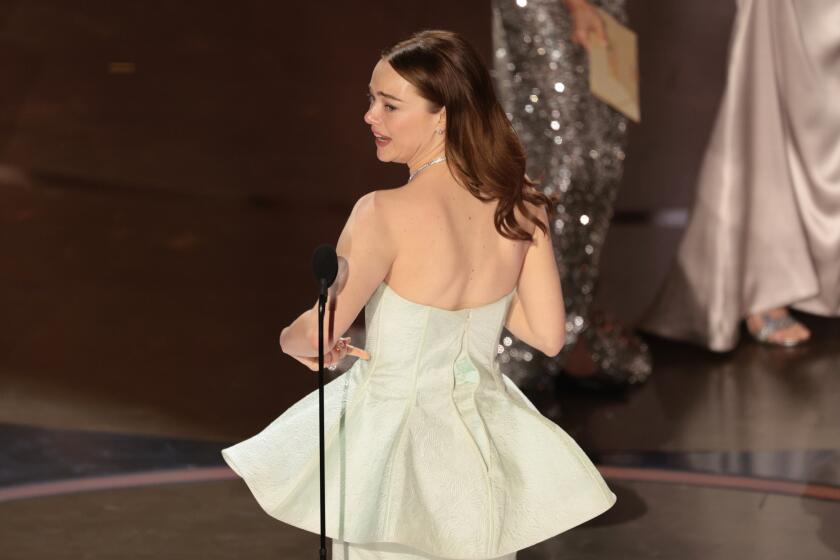Picks of an Odd, Flawed Oscar Litter
Having written about the Oscars for three decades now, I’m bound to say I can’t remember a year when the choices facing the 5,000-odd academy voters seemed so vexingly perplexing.
Not, heaven forfend, because of a glut of masterworks. As Kenneth Turan and other critics have complained, there is indeed a severe shortage of masterworks and hardly an important film that is not in one degree or another flawed. What also seems uncommonly true this time is that the voters will have to sort out some matters of form and content (or form vs. content).
There is always a school of criticism that sets form higher than content; if the surfaces are glossy and the joinings smooth, the film need not be about much of anything. Another school of criticism, in which I enrolled early on, feels that if a film has a lot on its mind, it is possible to forgive a relative lack of cinematic razzle-dazzle. The schools are not mutually exclusive, and the seldom-achieved ideal is when form and content are so beautifully matched as to become one engrossing whole.
In that regard, how is it possible to see the front-running “Bugsy” except as a triumph of form over content? It is a wonderfully sophisticated piece of filmmaking, well-basted with sex and sadism, with the result, intentional or not, of glorifying a two-bit murderous bum whose violent demise only suggests that once in a while society has the self-cleansing powers of a good electric range.
It is the second major occasion on which Warren Beatty has been charismatically blown to bits. The difference, I think, is that “Bonnie and Clyde” had a good deal to say about the whole gravely depressed society in which the outlaws arose and to which they became folk heroes of a sort.
The balletic mowing-down of Beatty and Faye Dunaway had a sad if not tragic inevitability, with as many inferences as you cared to find, not least that society likes outlaws but only up to a point--and resents anyone having too good a time. In Robert Benton’s film, the form and the content matched.
“The Fisher King” was for me the most startlingly original piece of the year, a phantasmagoric but still identifiable look at a society in which the possibilities of love and loving concern are continually at risk from the pressures of the frenzied but dehumanizing thrash of daily living, although a selfless act in aid of a friend is still possible.
The four central performances are spectacularly fine, the initiating premise arresting, writer Richard LaGravenese a new voice to be listened for again. A dance in Grand Central Station is a set piece that will I suspect be excerpted forever. Yet Jeff Bridges’ wall-scaling quest for the loving cup grail, neither real nor surreal, and some maudlin goings-on at bedside suggested that the vision may have been too rich to sustain. And what you saw at last was a deeply felt and well-cut mosaic with an unfinished corner, the parts (in a double sense) outreaching the whole.
Like “The Fisher King,” “Kafka” was not quite like anything else around. Its black-and-white images were in the wonderful chiaroscuro tradition of “The Third Man,” and when the film did move into color, it was really a further reminder that the medium lost a great force when it abandoned black and white. “Kafka” was an exercise in high cinematic style, but it also captured the author’s world (and not his alone, either) in which the real and the surreal blend like smoke and fog and beget a chilling, ungraspable terror. The voters will have to decide whether Steven Soderberg’s artful departure from “sex, lies, and videotape” can compete with the big domestic productions.
“The Silence of the Lambs,” testing among other things whether it matters negatively to have come out early in the year, is another gem of filmmaking, with what I think “Bugsy” lacks: a star to care about as well as to watch in fascination. What Jonathan Demme’s thriller is about is perhaps problematical; like the book it is an entertainment. Yet there is also something irresistible about police procedures (especially in the age of the serial killer). As the movies have been proving for years, there is also something hypnotic about an obsessed and aberrant personality seen close up. The film’s form is dazzling, it is not quite about nothing and performances better than Anthony Hopkins’ and Jody Foster’s are not to be found.
Oliver Stone’s “JFK” is not about nothing either, to say the very minimum. It is an act of advocacy, a polemic, willing to sacrifice the actual to the persuasive, and raising, as the quasi-documentary always does, disturbing questions about where the actualities begin, end or are hidden. On its own terms, the film stops in its tracks for a startlingly insipid look at Jim Garrison’s domestic life. The film’s skills are otherwise of a very high degree. In the end only the already-persuaded are likely to buy into the totality of Stone’s massive conspiracy thesis. But he captures all the pain, unresolved doubts and continuing despair of the assassination.
What will be at issue in the consideration of “The Prince of Tides” are the voters’ feelings about the redoubtable Barbra Streisand. By any reasonably objective standard, it is an uncommonly well-directed film, most especially in the performances she has encouraged from Nick Nolte (about which virtually everyone is in agreement), from Kate Nelligan and Blythe Danner and her own son Jason Gould.
It’s moot to speculate how someone else would have directed Streisand or how she might have directed another actress in the role. Seen on its own terms, it’s an earnest and admirable portrayal. It’s just
that Streisand is so indelible it’s hard to see one of her performances on its own terms.
The score is overwhelming in the “Wuthering Heights” tradition, and the villainous males--Streisand’s smirky violinist husband and Nolte’s wretched father--are caricatures. Yet as a study of the Nolte character slipping the stranglehold of the past, “The Prince of Tides” stands as an obeisance to the grand tradition of the romantic melodrama, evoking an earlier Hollywood.
A further remove from “The Silence of the Lambs” and “JFK” is hard to imagine, but the academy membership will have to decide whether “Beauty and the Beast” can stand in their company as best picture. It’s never happened, and the 2,000 voters in the actors’ branch alone may have deep feelings about applauding characters who can be erased with a pencil. Yet the aim of the awards is to identify and honor excellence, and a more sophisticated, confident piece of musical storytelling has not come along in years, and a special Oscar seems inadequate to the occasion.
If many of the year’s major films seem largely exercises in technique (symbolized by the biggest money-winner, “Terminator 2”), there have been those rare films in which it is clear the content came first. And this was never clearer than in Lawrence Kasdan’s “Grand Canyon.”
His look at a small sampling of characters thrown together by the often acrid complexities of life in Southern California dramatizes almost every problem we live with: racial and economic tensions, drive-by shootings and violence generally, earthquakes, traffic, smog and the embracing, enveloping hunch that things used to be better than this, ought to be better than this but may get worse before they even begin to get any better than this.
The acting, by an ensemble headed by Kevin Kline and Danny Glover, is terrific, and the form of the piece--the pace, the nature of the events and confrontations, the sharp-eared accuracy of the dialogue and the continuous awareness that it is all happening in a real and recognizable city--is impeccable.
Yet it is all the things that Kasdan had on his mind, obviously, that got the piece going. Chief among them is the idea that lack of communication will be the death of us. The film is daring in that the characters, Glover in particular, speak what is on their minds (for which read Kasdan’s mind) and do so at unembarrassed length. “Grand Canyon” is a miracle of articulation, and for anyone who cares about thoughts expressed as credible dialogue, the film is a profound pleasure.
The astonishment, given all the dreadful aspects of our times as Kasdan lays them before us, is that he ends on a note of resolute optimism, founded (it may be) on a view of mankind considered on the scale of geologic time (the Grand Canyon is not an accidental last setting).
Kasdan finds both the need and the possibility of a restoration of the communication, caring and civility that he has shown as gravely endangered virtues. I hope that with all their perplexing choice-making in front of them, the voters find a way to say thanks to Kasdan for his hopeful maybe.
“Thelma & Louise” (another early-year arrival I trust will not suffer for it) had something on its mind that divided the audience right down the middle, with both men and women on both sides of the arguments.
The stars’ final vrooming leap into the canyon and eternity was seen as an unnecessarily harsh resolution to the mess they had got themselves into. There were also complaints that there wasn’t a decent gent in view (except possibly for the sympathetic but remote and powerless Harvey Keitel figure).
But Callie Khouri’s script had a rare quality of passion, and it bespoke many of the angers women feel about a world in which they have still made only a slight dent in male chauvinism. “Thelma & Louise” was about freedom, independence and equal treatment, defined (if not principally) as the right to be let alone.
Seldom did a caustically funny and eventful entertainment seem to be such an acting-out of old, deep resentments. Given the premise, the grand leap into the canyon was as much a philosophical inevitability as the only workable plot device to wind things up.
“Hook” was one of the year’s slightly flawed wonders. It is regrettably overlong for the youngest of its potential customers (although it will probably be there waiting for them in years to come). But, that said, it is a gee-whiz tour of the possibilities of motion picture production and effect making. And, very much like Steven Spielberg’s “ET,” it builds its fantasy on a base of all-too-real modern-day family crises.
Before ET showed up in that film, the boy’s mother had been observed weeping into the phone to a suburban pal, that her ex had taken off to Mexico with his new lady. “And he never did like Mexican food,” she weeps, as if it were the ultimate betrayal. Funny, but also providing an unexpected taste of reality, against which the fantasy becomes more than usually welcome.
This time, of course, Robin Williams is the very parody of the success-driven modern executive, only temporarily chagrined at his inability to find good time for the wife and kids. In an appropriate creative twist, he is the mercantile pirate, badly needing a reinfusion of innocence to contend that delightful old and wiggy blackguard Hook, the ever-surprising Dustin Hoffman.
It must be bemusing to the director to hear complaints of too much decor in lieu of too little. But what’s wrong with a lot of gee and a lot of whiz. Not for the first time, the crowds have ignored the mixed reviews.
Usually, whether or not a reviewer admires a film, it is reasonably easy to guess how well it will do at the box office. What you thought about “Jaws” (if you could find objections) hardly mattered; you knew it would enjoy landslide success. “Love Story” at first glance meant never having to be sorry about the grosses. What you thought about Bergman’s “Cries and Whispers” hardly mattered either; you knew it was too austere and sobering to find wide acceptance.
The great popularity of “Cape Fear” has been confounding. It struck me as violating a cardinal principle of film in having almost no one in view whose fate you gave a damn about. Even the daughter seemed a self-pitying sort, verging on brattiness. The nastiness of husband and wife took a good deal of the suspense out of De Niro’s siege, so it seemed to me, and the horrors of the yacht in the whirlpool were curiously unconvincing as special effects. In general De Niro’s villainies were so outrageous that until he began to cannibalize Nolte’s mistress he was almost likable.
That shows you what reviewers know. The film appears to have touched some collective paranoid nerve in the audiences, who find final comfort by the screen’s traditional insistence that the bad guys get it in the end.
An odd year, all in all, with unalloyed excellence in thin supply and the box office a no more consistent guide to virtue than it usually is. Also, as usual, the voting will focus on only a handful of the 238 eligible films. You tip a hat to the good and adventurous little films with the limited play dates and the shriveled advertising budgets that never caught the eye of the 5,000. And you hope, as always, that at least the biggies will be seen for their virtues and not their grosses.
More to Read
Only good movies
Get the Indie Focus newsletter, Mark Olsen's weekly guide to the world of cinema.
You may occasionally receive promotional content from the Los Angeles Times.






